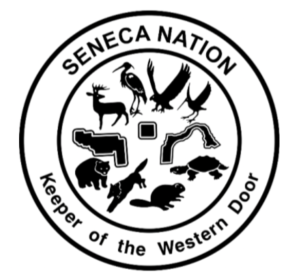
THE LANGUAGE OF PERSEVERANCE
Seneca Nation using gaming revenues to preserve culture, history and language
ALLEGANY TERRITORY, SALAMANCA, N.Y – CATTARAUGUS TERRITORY, IRVING, N.Y. – The Seneca Nation’s foray into casino gaming twenty years ago has been transformational in a number of ways. The buildings built by the Nation, representing nearly $2 billion in private investment, dominate their local skylines. Inside, thousands of workers welcome and look after the needs of millions of annual visitors from across the country and around the world, earning hundreds of millions of dollars in annual payroll – wages and benefits that help support their families.
However, some of the most powerful impacts of the Nation’s historic investments, are seen and heard on the Nation’s territories.
After generations of attacks, forced relocations and land seizures, and harmful, often violent, “assimilation” policies and practices by other governments, the Seneca Nation’s culture, and especially its traditional language, could have been lost to time. Instead, they are again beginning to flourish.
“Gaming provided us more than a path toward economic sovereignty,” said Seneca Nation President Rickey Armstrong. “It has provided an opportunity to sustain and strengthen our cultural roots and identity, and to preserve who we are and who we have always been as a people.”
Revitalizing its traditional language is a key priority for the Nation, which commits millions of dollars annually, largely from gaming revenues, to various educational and cultural programming and services.
Today, the Seneca Nation’s Language Department is implementing a strategic plan to increase both the number of proficient speakers of the language and, as important, the number of teachers who can help others, from children to adults, learn the language of their ancestors.
An Immersion Program provides adult learners the opportunity to increase their proficiency with the language, in turn creating teachers, resource developers, transcribers, and others who can increase the use of the traditional language within the Seneca Nation.
“No college or university can grant a degree in our traditional language,” said Donald “Flip” White, a former Education Director on the Nation’s Allegany Territory who is dedicated to language revitalization and cultural advocacy. “Our teachers can’t go to Teacher’s Pet or other stores for materials and resources. It’s up to us. We have to honor those who came before us to make sure their work and sacrifice wasn’t in vain.”
The program also houses an Immersive Language Nest to help support multi-generational language transmission in households with full-time adult learners and pre-verbal children. Children in the Language Nest program hear the traditional language throughout the entire day, including from the morning announcements at the Early Childhood Learning Centers to their time at home, where their families are encouraged to use the language as much as possible.
“To learn the language, you have to hear it. The children, who are not even old enough to speak yet, react to it,” said White, who has seen this firsthand with his 8-month-old grandson. “Children are great imitators, so let’s give them something great to imitate.”
In addition to the Immersion Programs, the Seneca Nation Language Department and the Faithkeepers School, located on Nation territory, utilize several educational programs and resources, including audio and visual aides and interactive resources, such as Memrise, a web and mobile application, to reinforce learning and use of the traditional language among all age levels of Senecas. The Faithkeepers School recently received a 5-year grant from the Administration for Native Americans to expand its Montessori program from serving children ages 3-6 to children up to 9 years old.
The Nation also works with local school districts serving students from its territories, including Salamanca, Gowanda and Lake Shore, to help fund Seneca language teachers in the schools.
Over the past decade, the Nation has worked with SUNY Fredonia to lead the effort to encourage the New York State Education Department (NYSED) to establish the Indigenous Culture and Language Studies Certificate, which would make tenure possible for Indigenous Language teachers. The proposal, which is being considered by the New York State Board of Regents would allow Native Nations the ability to create their own assessments for language proficiency for the certificate candidates.
“In order for our language to continue to grow and thrive for our future generations, we need to cultivate and grow the next generations of teachers and give them the tools they need to fulfill the awesome responsibility of keeping our language strong and vibrant,” President Armstrong said.
Because of these widespread efforts, White sees tremendous progress being made and a bright future ahead.
“If our children learning the language today continue to grow together, go to school together, and use the language together, the classes and the generation behind them become the expansion,” he said. “The seeds are being planted today. After 20 more years, we’ll have an entire generation of people who grew up with the language, and that’s how it grows.”
The Seneca Nation’s gaming Compact, which helps the Nation provide critical funding for programs and services for its people, expires in December. For more information on the importance of a fair and equitable Seneca gaming Compact, visit StandWithSeneca.com.

